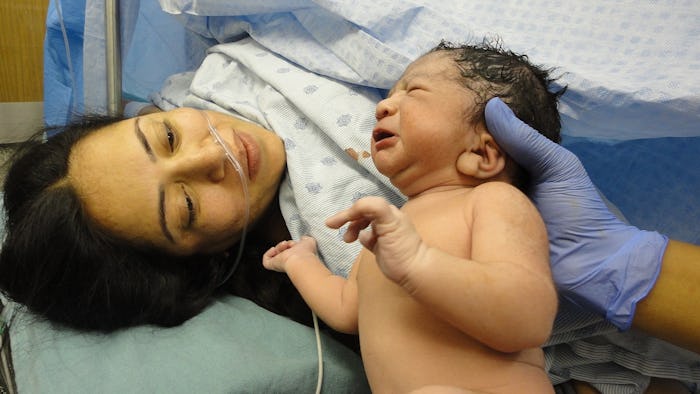Life
What Happens To Your Butt Hole When You Give Birth? Here's What To Prepare For
It's no secret that giving birth takes a major toll on your body. From the first nine months of growing another human being to the actual birthing process, every stage of pregnancy puts your body to the test. When it comes to birthing your baby, there are numerous questions to consider. But one of the most widely asked questions of the birthing process is, what happens to your butt hole when you give birth?
According to Parents, it's fairly common for women to experience passing gas, and even a bowel movement while delivering a baby. As the baby descends through the birth canal, air gets forced out of the anus, causing you to pass gas. If you've had an epidural, this is especially likely, as epidurals paralyze the anal sphincter, which is responsible for maintaining the seal that allows you to control gas and bowel movements. According to Arianna Sholes-Douglas, director of the High-Risk Pregnancy Center at Mercy Medical Center, neither of these things are anything to be ashamed of. "It's purely a space issue," Sholes-Douglas told Parents. "As your baby's head makes its way through the birth canal, the rectum gets flattened and its contents are pushed out."
You may also experience tears in the perineum (the stretch of skin between the vagina and the anus), which is fairly common. Dr. Shannon Clark, associate professor in the Division of Maternal-Fetal Medicine at the University of Texas, told U.S. News that about 65 percent of women who delivery vaginally will need stitches to repair lacerations. Stitches will affect things like soreness, and your level of comfort while experiencing bodily functions until they heal.
Aside from lacerations that may occur on the outside of your body, it's also possible that you may cause the lining of your anus to tear. Anal fissures are a common occurrence in pregnancy, and may occur before or after you give birth. The pressure and strain on your muscles during pregnancy and childbirth are often times the culprit of anal fissures. Though they're painful, and they may cause some bleeding, they don't last forever. According to WebMD, most anal fissures heal at home and on their own within a few days. After pregnancy, this could take a bit longer as the consistency of your stool has changed. You definitely want to mention any bleeding to your doctor, who may prescribe a stool softener for you to ease the process.
Pregnancy hormones have been known to slow down your gastrointestinal system, as do some pain medications that are commonly prescribed for new mothers. You may also be reluctant to push out a bowel movement if pregnancy has caused hemorrhoids or tears, for fear of pain. Dr. Clark told U.S. News that for these reasons, constipation is common in mothers post-birth. She recommends taking a stool softener, and making sure you're getting enough fiber in your daily diet to prevent further disruption in your bowel movements.
Hemorrhoids are also a common side effect of giving birth. If you notice pain during bowel movements, of if you experience swelling near your anus after you give birth, you may have hemorrhoids. The Mayo Clinic classifies hemorrhoids simply as stretched or swollen veins in the anus or lower rectum. To ease any discomfort you may experience while your hemorrhoids heal, the Mayo Clinic recommends soaking in a warm tub, and applying chilled witch hazel pads to the affected area. If your hemorrhoids are especially painful, your doctor may prescribe a topical medication to expedite the healing process.
You may also experience the inability to control your bowel movements after a vaginal delivery. The Mayo Clinic recommends frequent Kegel exercises to help with any mild fecal incontinence you may experience.
Though it may be daunting to think about all of the things that can happen to your body during childbirth, consulting with your doctor about any concerns you may have about the delivery is always the best way to soothe your worries. Your doctor will be able to provide you with advice on how to prepare for delivery, and how to take the best care of yourself post-delivery.
